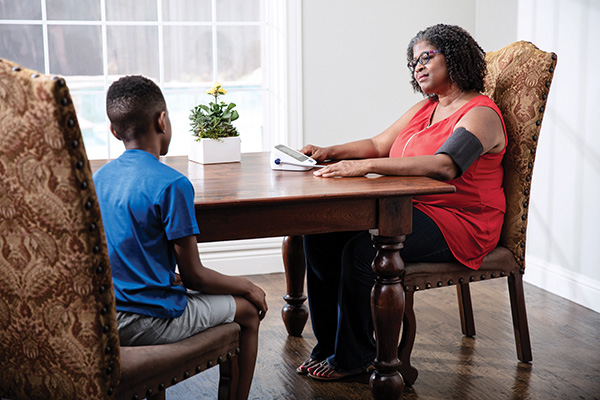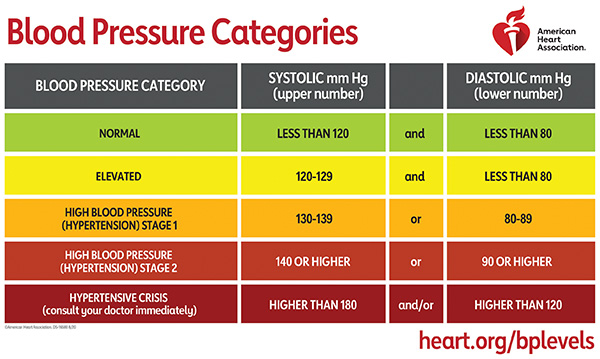Take Control: How managing blood pressure can help save lives
Nov 28, 2022 02:34AM ● By Family Features
Effectively managing your blood pressure can help reduce your chances of life-threatening medical events, even death.
Gain confidence and learn how to take control of your blood pressure with these tips and resources from the American Heart Association.
The Silent Killer
High blood pressure is often referred to as the “silent killer” because it typically has few, if any, noticeable symptoms but can lead to heart attack, stroke, heart failure and even death. Many people with high blood pressure don’t even know they have it. Some overlooked symptoms can include dizziness, facial flushing and blood spots in the eyes.
Understand Your Readings
Effectively managing your blood pressure can help reduce your chances of life-threatening medical events, even death.
Gain confidence and learn how to take control of your blood pressure with these tips and resources from the American Heart Association.
The Silent Killer
High blood pressure is often referred to as the “silent killer” because it typically has few, if any, noticeable symptoms but can lead to heart attack, stroke, heart failure and even death. Many people with high blood pressure don’t even know they have it. Some overlooked symptoms can include dizziness, facial flushing and blood spots in the eyes.
 Understand Your Readings
Understand Your Readings
The only way to know if you have high blood pressure is to regularly take an accurate blood pressure measurement. Understanding your results is key to controlling high blood pressure. Blood pressure numbers of less than 120/80 mm Hg are usually considered within the normal range, yet it is important to talk to a doctor about your healthy range. Even if you fall within a healthy range, it can be beneficial to stick with heart-healthy habits like following a balanced diet and getting regular exercise. Consider these numbers and ranges to know if it’s necessary to take action:
- Elevated blood pressure is when readings consistently range from 120-129 mm Hg systolic (the upper number) and less than 80 mm Hg diastolic (the lower number). People with elevated blood pressure are likely to develop high blood pressure unless steps are taken to control the condition.
- Hypertension stage 1 is when blood pressure consistently ranges from 130-139 mm Hg systolic or 80-89 mm Hg diastolic. At this stage, doctors are likely to prescribe lifestyle changes and may consider adding blood pressure medication based on your risk of atherosclerotic cardiovascular disease, such as heart attack or stroke.
- Hypertension stage 2 is when blood pressure consistently ranges at 140/90 mm Hg or higher. At this stage, doctors are likely to prescribe a combination of blood pressure medications and lifestyle changes.
- A hypertensive crisis requires medical attention. If your blood pressure readings suddenly exceed 180/120 mm Hg, wait 5 minutes then test again. If your readings are still unusually high, contact your doctor immediately. Seek emergency help if your blood pressure is higher than 180/120 mm Hg and you are experiencing signs of possible organ damage such as chest pain, shortness of breath, back pain, numbness or weakness, change in vision or difficulty speaking.
Know Your Risk
While many risk factors for high blood pressure may be related to your age, gender and family history, there are also risk factors you can change to help prevent and manage high blood pressure. People at added risk may be those who engage in lower levels of physical activity, eat a diet high in sodium (particularly from packaged, processed foods), may be overweight or obese, drink excessive amounts of alcohol and may have multiple chronic conditions.
Talk About It
Whether you’re making changes in your own life to combat high blood pressure or helping someone else, positive feelings and confidence are longer-term motivators to making health changes. If you’re talking with friends, loved ones or your doctor, be prepared to ask open-ended questions. Be curious and kind to yourself and others you may be helping.
 Lowering Your Pressure
Lowering Your Pressure
You can reduce your risk of heart disease, stroke, heart failure and even death with lifestyle changes and medication.
Watching your weight, especially if you are overweight or obese, can bring health gains; losing as little as 5-10 pounds may help lower your blood pressure. Managing your stress by relaxing for short periods during your workday, at night and on weekends is another productive practice.
If you have diabetes, it’s important to work with a doctor to manage the disease and reduce your blood glucose levels.
If you think you could have sleep apnea, getting screened for and treating the condition can also reduce your risk for developing high blood pressure.
When you have high blood pressure, medication may be an important part of your treatment. Follow the recommendations carefully, even if it means taking medication every day for the rest of your life.
When you’re discussing high blood pressure concerns with your health care provider, also be sure to talk to your doctor about over-the-counter pain relievers that may raise your blood pressure. Talking with your doctor can help you identify over-the-counter pain medications that won’t raise your blood pressure to ensure you’re not creating a blood pressure problem while treating other concerns.
Getting Ready for Your Appointment
Think about what challenges you face in controlling your blood pressure that you need to share with your doctor to create a plan that works for you. Start by considering the answers to these questions to discuss with your health care provider:
- How often do you check your blood pressure?
- Do you keep a log of your blood pressure measurements?
- Are you taking medications as prescribed?
- What are some things you can do to have less salt in your diet?
- What are some reasons it can be hard to manage your blood pressure?
- What are some things you’d like to discuss during your appointment?
Learn more about monitoring and managing high blood pressure at heart.org/bptools.
Photo courtesy of Getty Images (man talking with nurse)
